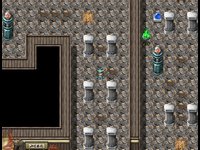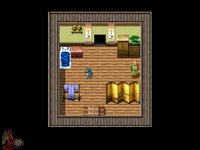|
|

|
PLATFORM
|
PC
|
BATTLE SYSTEM
|

|
INTERACTION
|

|
ORIGINALITY
|

|
STORY
|

|
MUSIC & SOUND
|

|
VISUALS
|

|
CHALLENGE
|
Easy
|
COMPLETION TIME
|
Less than 20 Hours
|
|
OVERALL

|
+ Promising setup for sequel
+ Well-realized world
- Combat takes awhile
- Dungeon exploration gets monotonous
- Sometimes-clunky exposition
|
Click here for scoring definitions
|
|
|
Prodigy of the North: Akatori is an RPG Maker title that begins with an altercation between Misaki and Masajun, sister and brother on opposite sides of a civil war. After a temporary alliance to escape a cave-in, the two separate again to serve their objects of allegiance. The story subsequently focuses on Misaki, commanded by the estranged Empress to go through the surprisingly complicated process of summoning an assassin to end the Emperor's life.
Akatori's tale has an unbalanced amount of dialogue, with the first hour featuring plenty of expository exchanges that don't feel natural. Then the plot takes up considerably less screen time until the finale, with an occasional text scene serving to break up dungeon exploration for most of the game. The dedicated setting of a Japanese-derived kingdom is thoroughly realized, but occasionally the game assumes players understand what a noun, such as Jiro, means when characters speak it constantly. Some of these terms never receive a definition in the game, and even the ones that do seem to assume the nouns are commonly understood by players.
The efforts to imbue the characters with personality are a mixed bag, mostly due to the truncated playing time caused by splitting up what was originally to be a significantly longer game. Where the game finally succeeds in becoming interesting is at the finale, introducing an interesting twist that portends promisingly for the sequel. The eight or so hours prior to that are unfortunately much spottier in terms of interesting narrative.
 There must have been a sale on skull-topped pillars at Home Depot that week.
There must have been a sale on skull-topped pillars at Home Depot that week.
|
|
Akatori's combat is a fairly standard turn-based affair, though the presence of a turn order gauge is welcome. Beyond that, battle proceeds in a manner anyone familiar with turn-based RPGs will instantly recognize. The random encounter rate is not overwhelmingly high, but the rewards from each individual fight are small enough that quite a few skirmishes will pass before any levels are gained. Dungeons occasionally include some rock pushing or multiple entrance puzzles, but these are over so quickly that they can't supplement the combat well.
Grinding for levels is not as important as using the points accumulated through fighting to learn new skills. Perhaps owing something to Akatori's short length, learning everything with the characters who stay for the entirety of the game requires no extraneous effort. Once characters have every attainable ability constant random combat starts to lose its allure, because killing enemies inside of one round requires prodigious luck. Akatori's adversaries tend not to be overwhelmingly powerful, and the damage they do can be healed with the regular drops of healing items along the way, but their own HP is high enough that it can take several turns to put them down. This turns standard fights into time-consuming shenanigans without much real threat of defeat unless the player forgets to heal.
The music of Akatori is not necessarily superb, but it does its job very well. The instruments used definitely evoke the Japanese setting of the game in a fitting way. The individual compositions vary somewhat in quality, but the stronger ones are excellent for setting a mood and are enjoyable in their own right.
 Don't get your hopes up, the scenery is solely for decoration and not interaction.
Don't get your hopes up, the scenery is solely for decoration and not interaction.
|
|
The visuals of Akatori are a mixed bag. Character portraits use a distinct art style, and certain field areas are interesting to navigate thanks to eye-pleasing botanical patterns. RPG Maker visuals are probably to blame for the several caves and towers which look indistinguishable from each other as the game progresses, but the result is still monotonous to behold.
Prodigy of the North has a fair number of things going for it, such as the well-realized setting and an excellent hook to its forthcoming follow-up. It is an odd thing to say that the promise of its continuance is a highlight, though, and not one recommended in most other forms of popular culture. Akatori is a relatively quick ride that comes with quite a few bumpy segments. If that sounds enticing, the game will deliver along those lines.
Review Archives
|









